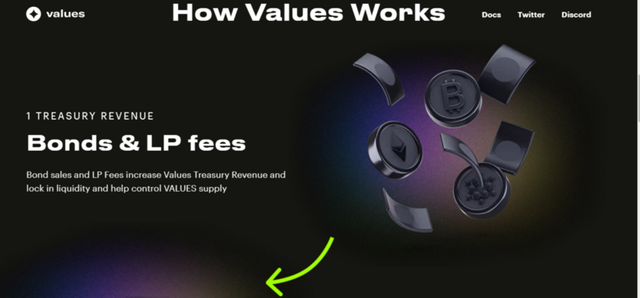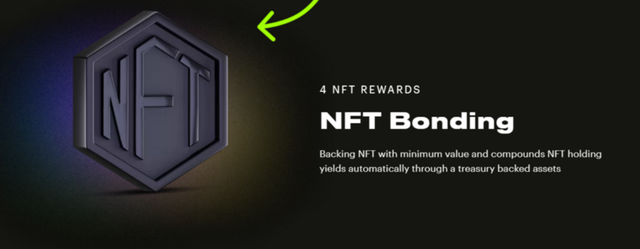Values is Metaverse Reserve Protocol.
Values is Metaverse Reserve Protocol on Polygon Network based on the $VALUES token.

#polygon #crypto #cryptocurrency #valuesfinance
What is Values?
Values is Metaverse Reserve Protocol on Polygon Network based on the $VALUES token. Each $VALUES token is backed by a basket of assets (e.g. MAI, FRAX) in the Values treasury, giving it an intrinsic value that it cannot fall below. Values Protocol gives a possibility to back NFT tokens to the treasury liquidity. Values introduce economic and game-theoretic dynamics into the market through staking and bonding.
Values is partly fork for OlympusDAO with own twist applied for NFT Bonding for metaverse space and based on Polygon network.

Abstract Values DAO
Values DAO is organization to realize and implement a very significant shift in the application of economic theory. This shift can be expressed in the following way: in digital economy, the economic forces of demand versus supply are generalized into forces of internal coordination versus price coordination. Supply and demand pertain only to price coordination, while entrepreneurship/self-organization (which falls outside neo-classical price theory) pertain to internal coordination. The framework of internal coordination theory is able to explain economic productivity and intrinsic value within digital economy, as distinguished from the more specific materials economy.Internal coordination is still underappreciated as a form of economic productivity, with particular relevance to digital economy. Internal coordination is separate from the forces of supply and demand, and is what equilibrates or regulates supply and demand. Thus, it is what motivates natural self-correction and self-governance by market participants themselves from within the market. The market requires a human being, an entrepreneur, to recognize and solve existing coordination problems, outside of the price mechanism. This happens through the negotiation of social norms. The market is only self-regulating and self-correcting to the extent that common sense norms are negotiated and shared by everyday participants, through internal coordination.The dynamics of internal coordination versus price coordination were first articulated in transaction cost economics, by Ronald Coase in his essay The Nature of the Firm (1937), and later by Douglass North in Transaction Costs, Institutions, and Economic Performance (1992). Transaction costs are essentially extra-monetary communication costs of operating in a market. They include costs of planning, deciding, and deliberation. Essentially, transaction costs reflect the normative rules that internally self-govern and self-regulate market activity.
Bother of Values
They will likely form a strategy controlled liquidity framework for NFT metaverse space, in which the conduct of the $VALUES token is controlled at an undeniable level by the DAO. In the long haul they accept this framework can be utilized to enhance for dependability and consistency with the goal that $VALUES can work as a worldwide unit-of-record and mode of-trade cash in a decentralized metaverse. Temporarily, we mean to improve the framework for development and abundance creation.
How would I take part in Values?
There are two fundamental systems for market members: marking and holding. Stakers stake their $VALUES tokens as a trade-off for more $VALUES tokens, while bonders give LP or MAI tokens in return for limited $VALUES tokens later a fixed vesting period.

How might I profit from Values?
The primary advantage for stakers comes from supply development. The otter reaps new $VALUES tokens from the depository, most of which are conveyed to the stakers much obliged for the $VALUES tokens they advertised. Subsequently, the addition for stakers will come from their auto-intensifying equilibriums, however value openness stays a significant thought. That is, assuming the increment in symbolic equilibrium outperforms the expected drop in cost because of expansion, stakers would create a gain.
The principle benefit for bonders comes from value consistency. Bonders submit a capital forthright and are guaranteed a decent return at a set moment; that return is in $VALUES and in this manner the bonder’s benefit would rely upon $VALUES cost when the bond develops. Bonders benefit from a rising or static $VALUES cost.
Who made Values?
Values is a fork of OlympusDAO with its turn applied for NFT space on the Polygon Network that will help different tasks construct a decentralized metaverse.Thecenter group has consolidated involvement with software engineering, cryptography, economy, and plan. Followed by long stretches of involvement with crypto.They like to remain for the most part mysterious for the achievement of this task as a result of our target turning into a Decentralized Autonomous Organization.
Values intends to address this by making a free-drifting store money, $VALUES, that is supported by a bin of resources. By zeroing in on supply development instead of estimating appreciation, Values trusts that $VALUES can work as a cash that can hold its buying power paying little heed to showcase unpredictability.
Who runs Values?
As of now the vast majority of the choices are taken by the center group however team hope to have the option to transform this into a DAO-administered model quickly with your assistance values is expect to become Metaverse Reserve Protocol. In a present moment they would zero in on development. By joining NFTs and holding framework Values could turn into the main OHM fork with NFT loyalties.

Learn More:
Website: https://values.finance/
Twitter: https://twitter.com/ValuesDAO
Discord: https://discord.gg/xdNKGffeY2
Telegram: https://t.me/valuesDAO
Author
BTT Username: Galang setiawan
BTT profile: https://bitcointalk.org/index.php?action=profile;u=3401375;
Telegram Username: @galangsetiawan
Polygon Wallet: 0xd4dC5676F70009E5f5BE356500974F607116091a
Komentar
Posting Komentar